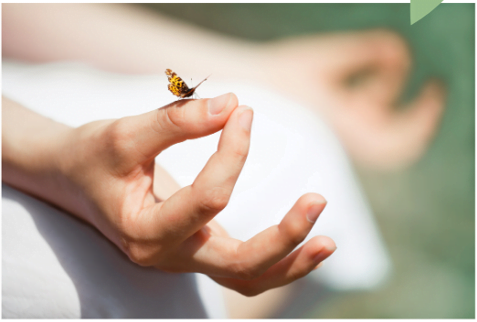Breathing into Well-being
In our chaotic world, where stress and anxiety seem to be present all the time, the quest for effective strategies to foster mental and physical well-being is more crucial than ever. One practice that has gained considerable attention in scientific research for its positive impact on health is meditation. In the millenary eastern tradition, the act of breathing is an essential aspect of most meditative practices, and it is also considered a crucial factor for reaching the meditative state of consciousness (Zaccaro et al., 2018). In this article, we explore various meditation techniques, focusing on breathing techniques and their benefits.

• Mindfulness for Mental Well-being:
Mindfulness meditation is associated with positive effects on psychological well-being and in the reduction of symptoms of a number of disorders. It has shown a significant improvements in anxiety, depression, substance abuse and pain (Goyal et al. 2014).
• Mindfulness Meditation and the Brain:
Neuroimaging discovered that mindfulness meditation leads to an increase in gray matter density in the brain. This suggests that regular mindfulness practice may contribute to structural changes in brain regions and improved cognitive functions, such as learning, attention, memory processes, problem-solving, emotion regulation, self-referential processing, and perspective-taking (Hölzel et al., 2011).
• Breath Control and Psycho-Physiological Correlates:
Slow breathing has effects on psycho-physiological factors. The main effects of slow breathing techniques cover autonomic and central nervous system activities as well as the psychological status. Breath-control techniques (<10 breaths/minute) can positively influence attention, negative affect, and stress in healthy adults (Zaccaro et al., 2018).

Breathing Techniques in Meditation:
• Diaphragmatic Breathing:
One of the simplest yet highly effective techniques is diaphragmatic breathing. This involves deep, slow breaths that engage the diaphragm, activating the body’s relaxation response. Diaphragmatic breathing can stimulate the parasympathetic nervous system, promoting a sense of calm and reducing stress.
• Box Breathing:
Box breathing is a technique that involves inhaling, holding the breath, exhaling, and holding again in a rhythmic pattern. This method can enhance cognitive function and reduce symptoms of depression (Streeter et al., 2017).
• Mindful Breath Awareness:
Mindful breath awareness is a fundamental meditation technique where practitioners focus their attention on the natural inhalation and exhalation of breath. Various studies, including those highlighted by Goyal et al. (2014), have associated this technique with decreased psychological stress and improved overall mental well-being.
Scientific research continues to unveil the profound impact of meditation, especially when incorporating various breathing techniques. From structural changes in the brain to improvements in mental health and cognitive function, there is a lot of evidence supporting the efficacy of meditation. Whether you prefer diaphragmatic breathing, box breathing, or mindful breath awareness, the key lies in finding a technique that resonates with you.
As we navigate the complexities of modern life, the ancient practice of meditation emerges as a powerful tool for cultivating a healthier mind and body. The science behind these techniques provides a compelling foundation for integrating meditation into our daily lives, paving the way for a more balanced and resilient self.
About Zen Meditation About Zen Meditation – Cope Centre
Follow us here Facebook
COPE is your Counsellor provider of Choice
Calling for help is the sign that your inner strength shines through. We understand that, and we encourage you to book an initial 15-minute free consultation with us here https://copecentre.org/free-consultation/
COPE Centre of Psychological Enrichment
Visit us at Level 3 – Suite 6 – 1111 Hay str, West Perth
🔹Book with us here https://copecentre.org/book-now/
📞 (08) 6556 6460
References:
• Goyal M, Singh S, Sibinga EM, Gould NF, Rowland-Seymour A, Sharma R, Berger Z, Sleicher D, Maron DD, Shihab HM, Ranasinghe PD, Linn S, Saha S, Bass EB, Haythornthwaite JA. (2014) Meditation programs for psychological stress and well-being: a systematic review and meta-analysis. JAMA Intern Med. 174(3):357-68. doi: 10.1001/jamainternmed.2013.13018.
• Hölzel BK, Carmody J, Vangel M, Congleton C, Yerramsetti SM, Gard T, Lazar SW. (2011) Mindfulness practice leads to increases in regional brain gray matter density. Psychiatry Res. 30;191(1):36-43. doi: 10.1016/j.pscychresns.2010.08.006.
• Streeter CC, Gerbarg PL, Whitfield TH, Owen L, Johnston J, Silveri MM, Gensler M, Faulkner CL, Mann C, Wixted M, Hernon AM, Nyer MB, Brown ER, Jensen JE. (2017) Treatment of Major Depressive Disorder with Iyengar Yoga and Coherent Breathing: A Randomized Controlled Dosing Study. J Altern Complement Med. 23(3):201-207. doi: 10.1089/acm.2016.0140.
• Zaccaro A, Piarulli A, Laurino M, Garbella E, Menicucci D, Neri B, Gemignani A. (2018) How Breath-Control Can Change Your Life: A Systematic Review on Psycho-Physiological Correlates of Slow Breathing. Front Hum Neurosci. 7;12:353. doi: 10.3389/fnhum.2018.00353.